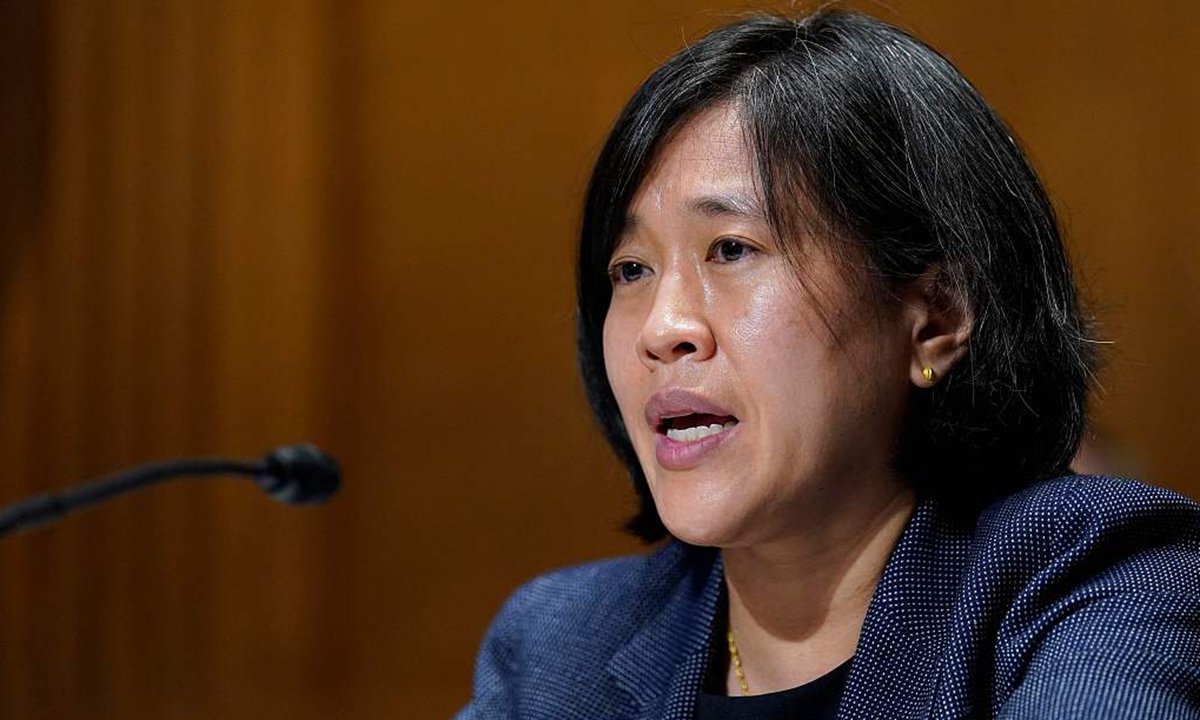
Katherine Tai. Photo: VCG
US Trade Representative Katherine Tai on Monday delivered remarks at the Center for Strategic and International Studies, a Washington think tank, outlining the Biden administration's new approach to the China-US bilateral trade relationship. Tai criticized that China, for long a time, has lacked "adherence to global trading norms," and expressed "serious concerns with China's state-centered and non-market trade practices." Overall, she showed a hard-line stance toward China. Meanwhile, she said, "Our [the US'] objective is not to inflame trade tensions with China," and will "start a targeted tariff exclusion process." When asked about decoupling from China, Tai said it was not realistic for the world's two largest economies to stop trading with each other. "I think that the issue perhaps is, what are the goals we're looking for in a kind of 'recoupling,'" according to Reuters.
Tai said the US will continue to work with allies to shape the so-called rules for fair trade in the 21st century. This is different from the practices of the Trump administration which sought to attack China in all directions by the US alone. Tai mentioned the US will "discuss with China its performance under the Phase One Agreement." She used the new term "durable coexistence" when talking about the goals of the Biden administration's trade policy toward China. On the other hand, Tai implied the US may take unilateral trade measures, including launching Section 301 investigations. She underlined the US has "all kinds of tools available" to pile pressure on China.
The Trump administration launched an all-out trade war against China in 2018, attempting to crush China, change China's basic economic policies, and even force China to revise its basic economic system. It is this system and these policies that have made the rapid growth of China's economy possible, reshaped Chinese people's livelihoods, and promoted China's rapid rise.
Based on the principle of equality and mutual benefit in trade, many specific issues of trade between China and the US can be adjusted. China has made corresponding efforts in terms of intellectual property, investment, and the US' demand for trade balance. However, if the US intends to shake China's foundations, prevent China from formulating plans to develop its technological innovation capacity, and change China's national policies conductive to promoting competitiveness, China will never permit it.
The US must recognize that China's fundamental competitiveness comes from the diligence and efforts of the Chinese people, and from the strong leadership of the Communist Party of China and the Chinese government, which effectively organizes and inspires the creativity of its people. China's practices are not "non-market," but harnesses the greater potential of the market economy and overcomes some of its drawbacks. Thus, these processes revitalize the market economy, improve its efficiency and contribute to the miracle of China's economy.
From Tai's remarks, we can see that the US has to some extent realized that it is unrealistic to "transform China" based on the US' interests and in accordance with their thinking. The US cannot achieve it. Washington also has a new understanding of the difficulty of decoupling the economies between China and the US and the fact that neither of the two sides can live without the other. The Trump administration's arrogant attempt to crush China's will has failed. China has proven its strong will and real resilience to fight back against repression. Now it is time for the US to make some adjustments.
China welcomes dialogue and negotiations, and is willing to make efforts to jointly build an equal and mutually beneficial China-US trade system. But we will adhere to the consistent manner of not making concessions on principle, based on doing our own thing, and not being afraid of any contest, including a protracted one. The China-US trade war has lasted for more than three and a half years. Instead of being weakened, China's economy has taken a step forward in comparison with the scale of the US. The Chinese people are more confident and their stamina continues to increase. We are clearly aware that all this is the basis for the US to consider using non-trade war coercive methods to discuss issues with China.




